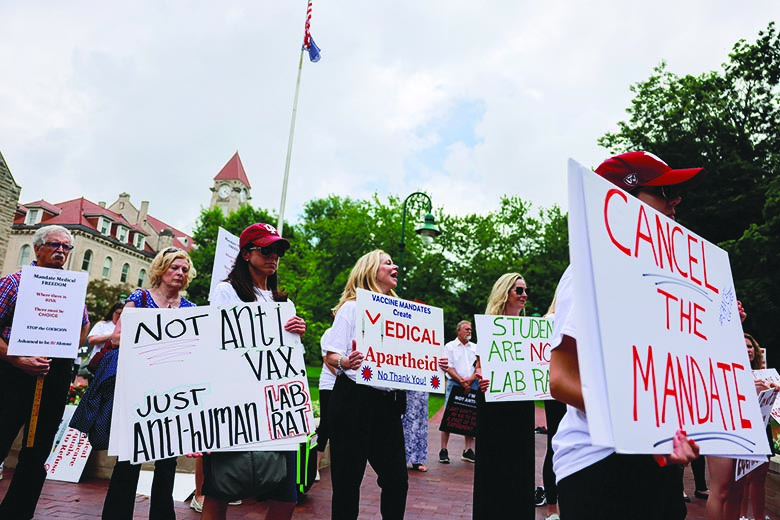The persistent partisan split in the US over COVID is increasingly dividing higher education over vaccination rules, stimulating protests, lawsuits, resignations, infections and renewed migration to online teaching. As with the broader battle lines in US society, the fight against requiring proof of vaccination status is most prevalent in politically conservative areas, often involving local governments forbidding such rules.

Anti-vaccine protest at Indiana University
The showdowns include faculty resignations or departures at Louisiana State University, Pennsylvania State University, the University of Alabama, the University of North Georgia and Middle Tennessee State University. On the other side, several institutions have been sued by students for mandating vaccination on their campuses, including California State University, the University of Massachusetts, the University of Connecticut and the University of Indiana. At some universities, even mandatory masking is too much. Clemson University and the University of South Carolina are among institutions where academic staff protested and sued just to win the right to expect facial coverings on their students.
Richard Creswick, professor of physics and astronomy at South Carolina who won a state Supreme Court ruling in favour of the mask requirement, says he cannot understand the opposition. “What is shocking to me”, says Creswick, whose wife is immune compromised as a result of cancer treatments, “is that some South Carolina politicians will sacrifice the health and lives of South Carolina citizens solely to further their political careers by pandering to and misleading their base on the efficacy of masks”.
Jeremy Fischer abandoned his tenured position as associate professor of philosophy at the University of Alabama rather than teach in the absence of mandatory student vaccinations. To do otherwise, he says “might render me complicit in a moral atrocity,” he says. While he and other departing professors might not get their jobs back, proponents of fundamental public health measures on college campuses are seen as likely to win ultimately, both legally and politically.
The universities of Connecticut and Indiana have already successfully defended their right to demand proof of vaccinations on their campuses, and legal experts say they expect others to prevail as well, given past US Supreme Court rulings on public safety.
Now without a job, Fischer says state politicians, university leaders who don’t stand up to them and fellow faculty who are also failing to demand basic health and safety policies, are equally to blame. “A sense of futility among academic instructors, staff and students, is perhaps the biggest obstacle to change,” he adds.
Also read: Covid 19 vaccine for children: Is India way behind?
Anti-Hindutva coalition
Censorship fears related to Hindu nationalism, or hindutva, have driven some US-based academics to mobilise into a new activist group and organise a major academic conference.
The South Asia Scholar Activist Collective (SASAC) was launched in July with founding members from eight US universities. Its first action has been to publish a Hindutva Harassment Field Manual to help academics targeted by the Hindu right wing, and also as a resource for university staff or managements who want to learn about the issue.
SASAC’s materials list various threats, the most dramatic of which came in 2020 to Vinayak Chaturvedi, an associate professor at the University of California, Irvine. His parents, who have been threatened before because of their son’s research, became victims of ‘swatting’, a type of harassment in which a hoax call is made to police that results in armed SWAT officers being dispatched to a person’s home. Women academics writing about South Asian politics have also reported receiving death and rape threats and warning to end or disrupt their employment.
These topics were discussed from September 10-12 in a Dismantling Global Hindutva Conference, backed by more than 40 institutions, including Harvard and Stanford universities, the University of Chicago and the University of California, Berkeley. SASAC hopes the conference will draw attention to what it calls “a form of hate little known in most of North America, distinct from the Hindu faith”. The group adds that academic freedom concerns might hinder transnational research and events, especially as India tries to internationalise its higher education system.
According to Purnima Dhavan, an associate professor of history at the University of Washington-Seattle, and one of the founding members of SASAC, a common misconception equates hindutva (a right-wing nationalist ideology) with Hinduism (India’s majority religion), Hindus (a people) and Hindi (a language). “Hindutva groups claim to speak for all Indians — and more specifically for all Hindus. This is highly problematic since both groups contain very diverse communities with a multiplicity of beliefs and practices,” says Dhavan. This distinction is often lost in the context of Western political correctness, where ‘Asians’ can be lumped together into a composite minority group.





















